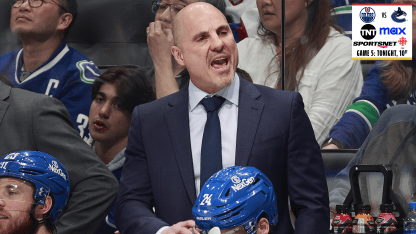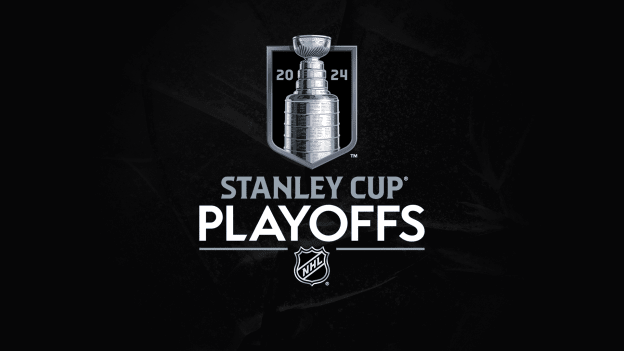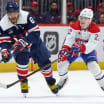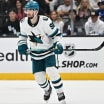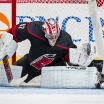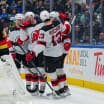EDMONTON -- Rick Tocchet wondered if he’d had lost his mind.
It was Jan. 22, 2023, and he had just been hired as coach of the Vancouver Canucks, replacing Bruce Boudreau. He had just left a job he loved as an analyst on TNT’s hockey broadcasts to take over a team that had the sixth-worst record in the NHL at 18-25-3.
“I’m not going to lie,” Tocchet told NHL.com. “For the first couple of days, I was asking myself: ‘What the hell did I do?’”
What he’s done is prove that he, and the Canucks, made the right decision. Since he became coach, Vancouver has gone 70-35-13 in the regular season, including 50-23-9 this season.
That record was good enough for first in the Pacific Division, making him a finalist for the Jack Adams Award, which goes to NHL coach of the year.
More importantly, the Canucks are still in the hunt for the Stanley Cup. Their best-of-7 Western Conference Second Round against the Edmonton Oilers is tied 2-2 entering Game 5 at home on Thursday (10 p.m. ET; TNT, CBC, TVAS, SN, truTV, MAX). They are looking to reach the Western Conference Final for the first time since the 2010-11 season, when they lost in the Cup Final.
Still, getting close is not good enough for the Scarborough, Ontario native. And in true Tocchet fashion, he’s going to let you know about it, no matter whose feelings might be rattled, including players on his own team.
A perfect example came after the Canucks’ 3-2 loss in Game 4 at Rogers Place on Tuesday, when they allowed the game-winning goal with 39 seconds left in regulation.
“Some guys are playing pause hockey, and you can’t win if you have five or six passengers,” Tocchet said at his postgame press conference. “There’s at least a half-a-dozen passengers tonight.”
He was a straight shooter during his 1,144-game NHL playing career, racking up 952 points (440 goals, 512 assists) and 2,970 penalty minutes, 10th all-time. Whether it was in the corners or on the score sheet, he got his message across.
Just like he does now as a coach.
This time he’s shooting from the lip. During a 1-on-1 interview with NHL.com this week, he made it perfectly clear why.
“It’s all about communication,” he said. “Say what you mean. Get your point across. Let them know what you want. Let them know what you expect so there are no misunderstandings.”
It’s a credo he has followed since moving behind the Canucks bench, even early on when he admits there was no shortage of chaos in and around the team.
“Again, I’m not going to lie to you,” he said. “I had a great gig with Turner. I really enjoyed it. The guys there were terrific. Turner Broadcasting, TNT, was unbelievable to me. And they made it tough for me to leave. As you know, I was going to re-sign there.”
Then the Canucks came calling. Specifically, team president of hockey operations Jim Rutherford. Tocchet was an assistant coach when the Pittsburgh Penguins, with Rutherford as general manager, won the Stanley Cup in 2016 and 2017. There was a good relationship there.
He left Pittsburgh to coach the Arizona Coyotes from 2017-2021. He had also coached the Tampa Bay Lightning in 2008-09 and 2009-10.
Those competitive juices wouldn’t allow him to turn down Vancouver’s offer.
“I just kind of like challenges,” he said. “And I knew there would be one when you're going to Canadian market.
“I remember thinking, ‘The Vancouver market, it's going to be one hell of a challenge.’”
Especially with an outspoken segment of fans calling for the team to tank after he took over in order to have better odds of getting the No. 1 pick in the 2023 NHL Draft and forward Connor Bedard. The fact that Bedard was from North Vancouver fueled that narrative even more.
Tocchet knew that for the Canucks’ fortunes to change, the culture had to do the same.
“First of all, blocking out the outside noise was something when I went in there was the one thing we really wanted to attack as a team,” he said. “We had to block out the outside noise.
“You go in there with people saying, ‘They should tank and should go for Bedard, so why are they winning? Why are they doing this? And why are they not signing some of their top players?’ There was a lot of noise that I think affected our players. And I think we kind of put a cocoon-kind of environment around in our room.”
How do you do that?
“Well, I think you have to create a safe environment in the inside when a player comes in there,” Tocchet said. “He knows that he feels safe. He can let his guard down. I'm not saying it was just because of me. But I felt when players were going in there they were still on guard.
“I felt as the year went on, guys started coming in and were more comfortable, being able to be themselves. It’s the trust factor. And when you get a player who’s always on guard and doesn't trust anybody, it’s tough to coach up a guy like that. They’re really not going to absorb information, but I felt players got more at ease and more in the buy-in role. Suddenly I didn’t even say that stuff because they started saying it to each other.”
Already familiar with their candid coach who preached a recipe of structure and team discipline, the Canucks bought into what Tocchet was selling.
They finished last season going 20-12-4, missing the playoffs by 12 points, and jumped out to a 7-2-1 record this season and never looked back. Suddenly, the concept of a fan base calling for the team to tank for Bedard a year earlier seemed like a ludicrous one, to be sure.
Especially to Canucks players who had found little team success in Vancouver.
“I think there was confidence when we started winning because of the way we were trying to play the game,” Tocchet said. “And we were having success. I thought that helped.
“And I felt the Quinn Hugheses, the J.T. Millers, the Elias Petterssons, the Thatcher Demkos, I think they were at the point where enough's enough. They were tired of this losing and tired of whatever was going on there and they just needed something to believe in.”
Tocchet ended up being that something.
Defeating the Nashville Predators in six games in the best-of-7 Western Conference First Round served to heighten the frenzy in Vancouver surrounding the team. But the series victory didn’t come without its own drama.
With starting goalie Demko and backup Casey DeSmith unable to play after three games because of undisclosed injuries, rookie Arturs Silovs got the call for Game 4 against the Predators in what could be the start of a Cinderella run. The 23-year-old has gone 4-3 with a 2.71 goals-against average and .907 save percentage while demonstrating the composure of a calm and cool NHL veteran.
“When Casey came to us after Game 3 versus Nashville with an ailment, there wasn't a ton of choices,” Tocchet said. “We figured Casey would eventually get back into it too.”
Except Silovs played so well, Tocchet says the decision became easy to stick with him.
“I think the way he's played, even when Casey got healthy, he's earned the right to take the net. He’s enjoying it,” Tocchet said. “And he seems like he's not rattled. Even after a bad goal or something bad happens to him. I think he bounces back really well.”
Now the second round against the Oilers is down to who can win two of the next three. And the biggest challenge remains figuring out how to defeat a team that features forwards Connor McDavid and Leon Draisaitl, who have combined for 16 points in the first four games of the series, Draisaitl with 10 (three goals, seven assists), McDavid with six (one goal, five assists).
So, how do you find ways of doing that?
Tocchet has played with plenty of Hockey Hall of Famers, including Wayne Gretzky with the Los Angeles Kings, Mario Lemieux with the Penguins, Ray Bourque with the Boston Bruins, Eric Lindros with the Philadelphia Flyers, and coached future Hall of Famer Sidney Crosby while an assistant with Pittsburgh.
As such, picking the brain of a legend like Gretzky is something he frequently does.
“I’m lucky that I can rely on someone like ‘Gretz’ for information or advice, you know, like Gretz in the way he can tell a story that helped him or help the team where it can help me,” Tocchet said. “There are other guys too -- (coaches) Craig Berube, Travis Green, Kelly Chase, it’s good to hear other voices sometimes.”
In the end, however, it’s Tocchet’s voice that reigns supreme with the Canucks these days, no matter who might like or loathe it.
“It’s a grind, but I love the grind,” he said. “And look, it’s a great organization and a great market. And it’s really cool to see the excitement in and around the team. I love seeing people get excited.
“As for how far we can go, here’s the thing. I think this is a team that believes even when we're down that we can come back. And I think when you have that you can be a dangerous team.
“When you believe in stuff, anything can happen.”
Especially if you believe in Rick Tocchet, judging by the past 16 months.
